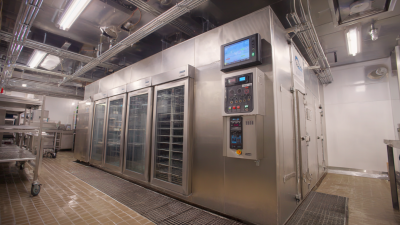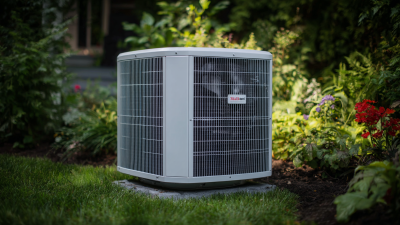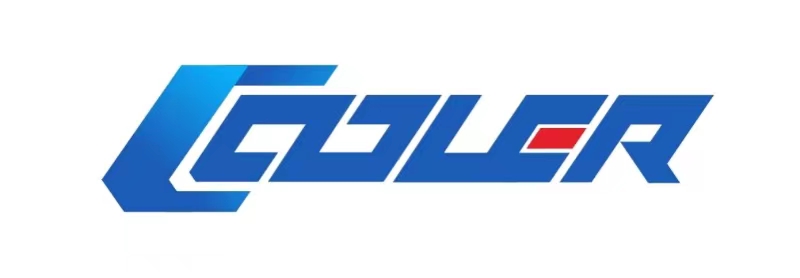Understanding the Science Behind Condenser Refrigeration: Innovations and Future Trends
Table of Contents
- Exploring the Fundamental Principles of Condenser Refrigeration Systems
- Innovative Technologies Revolutionizing Condenser Refrigeration
- Assessing Energy Efficiency in Modern Refrigeration Solutions
- Future Trends: Sustainable Practices in Refrigeration Technology
- The Role of Smart Sensors in Enhancing Refrigeration Performance
- Potential Challenges and Solutions in Advancing Condenser Refrigeration
- Enhancing Refrigeration Efficiency: Insights from Recent Market Reports on High-Quality L Type Condenser Components
- FAQS
- Conclusion
- Related Posts
You know, refrigeration tech is always changing—condensers are really taking center stage when it comes to innovation and making things more efficient. With the world’s need for cold storage growing—especially in stuff like food preservation and pharmaceuticals—it’s pretty important to understand not just the science behind it, but also the latest trends in the industry.

Exploring the Fundamental Principles of Condenser Refrigeration Systems
Condenser refrigeration systems are pretty much the backbone of how we stay cool these days. They use basic principles of thermodynamics—nothing too fancy—to transfer heat from inside your space to the outside. Basically, these systems work by cooling down refrigerants that absorb heat from the air indoors and then release it outside. Lately, there’s a lot of buzz around improving how efficient these systems are, like adding advanced materials or energy-saving tech. It’s all about making cooling more sustainable, whether it’s in homes or big commercial setups.
With the rising need for effective cooling—especially in places hitting really high temperatures—it’s more important than ever to focus on R&D in this area. Take solid-state cooling, for example—early research suggests it could cut down energy use big time and even get rid of nasty refrigerants. Plus, there’s a growing trend of collaborations, like those working on cutting-edge cooling solutions for AI data centers. These efforts aren’t just about better performance; they’re also about tackling environmental problems caused by traditional cooling methods. It’s pretty exciting to see how innovation is shaping the future of refrigeration, right?
Innovative Technologies Revolutionizing Condenser Refrigeration
Hey, you know, innovative tech is really transforming the whole world of condenser refrigeration. It’s opening up new possibilities for smarter, more efficient, and eco-friendly cold storage options. Things like advanced heat exchangers and smart control systems are making a big difference—they help save energy and cut down costs for businesses. Plus, newer techniques like vortex tube refrigeration and thermoelectric cooling are starting to pop up. These systems are more compact and better for the environment, so they can be used across a bunch of different industries without any hassle.
At Guangxi Cooler Refrigeration Equipment Co., Ltd., we’re right there, leading the charge with these new developments. We don’t just sell equipment; we offer custom solutions that fit the unique needs of each client. Whether you’re just starting to plan or ready to install top-notch refrigeration systems, we’ve got you covered. Our goal is to make the whole process smooth and stress-free. With our personalized, one-on-one service, we help businesses from different sectors tap into the latest refrigeration innovations and get the most out of them.

Assessing Energy Efficiency in Modern Refrigeration Solutions
You know, modern refrigeration has come a long way. These days, the focus is really on being energy-efficient to cut down on environmental impact and save some bucks on the bills. Thanks to cool tech like variable-speed compressors and heat exchangers, companies are rethinking how traditional condenser systems work. These upgrades don’t just boost performance—they actually help save energy too, making refrigeration more sustainable and wallet-friendly.
If you're looking to squeeze more efficiency out of your fridge or cooler, a few tips might help. Regular maintenance is key—keeping everything running smoothly prevents unnecessary energy drain. Also, investing in smart thermostats that tweak cooling based on when and how you use the system can make a noticeable difference. Oh, and don’t forget insulating those refrigerant lines properly—it's a simple trick to prevent energy waste and boost overall efficiency.
As the industry shifts toward greener options, natural refrigerants are becoming pretty popular. These alternatives not only cut down on carbon emissions but often have better thermodynamic properties, meaning they work more effectively. If you’re thinking about upgrading your system, checking out options that use eco-friendly refrigerants can really boost your energy savings and help support a more sustainable future in refrigeration. It’s all about doing your part while keeping things running smoothly and efficiently.
Energy Efficiency in Modern Refrigeration Solutions
This chart illustrates the energy efficiency ratings of different modern refrigeration technologies, showcasing innovations in condenser refrigeration systems over recent years.
Future Trends: Sustainable Practices in Refrigeration Technology
You know, the refrigeration industry is really going through a big change right now, all thanks to the urgent need to tackle climate change and cut down on environmental impact. Innovations in condenser tech are actually at the heart of this shift. These days, systems are being built to be super energy-efficient, often using natural refrigerants that have a much lower impact on global warming. It’s not just about being eco-friendly, though—these upgrades also help manufacturers stay on top of stricter rules and regulations, making sustainability a top priority.
And things are getting even smarter. Thanks to advances in digital tech, we can now monitor and control refrigeration setups in real time. Things like IoT devices mean operators can manage energy better and waste less. Plus, with AI-powered predictive maintenance, potential issues are spotted early on, so nasty breakdowns can be avoided. Looking ahead, combining new materials with cutting-edge digital solutions feels like it’s going to totally transform the industry even further. All in all, it’s exciting—these advancements not only meet today’s needs but also push us toward a more sustainable future.
Understanding the Science Behind Condenser Refrigeration: Innovations and Future Trends
| Dimension | Data Value |
|---|---|
| Average Energy Efficiency Ratio (EER) | 12.5 |
| Percentage of Refrigerants with Low Global Warming Potential | 65% |
| Growth Rate of Sustainable Refrigeration Technologies (2023-2030) | 8% CAGR |
| Conversion Rate to Natural Refrigerants | 50% |
| Investment in Refrigeration R&D | $1.2 Billion (2023) |
| Average Lifecycle of Refrigeration Systems | 15 years |
The Role of Smart Sensors in Enhancing Refrigeration Performance
You know, the way refrigeration technology has evolved over the years is pretty impressive, especially with how smart sensors are now a big part of the picture. These little gadgets really make a difference because they give us real-time info on things like temperature, pressure, and humidity. That stuff is super important because it helps fine-tune the whole cooling process, making sure everything runs smoothly and doesn’t waste energy. Honestly, it’s like having a kind of intelligent monitoring system that keeps everything in check.

And there's more—these smart sensors are also a game changer when it comes to maintenance. Instead of waiting for things to break down, they can spot potential problems early by analyzing data patterns. This way, issues can be fixed before they turn into costly failures, which means less downtime and lower maintenance expenses. Plus, with the whole Internet of Things (or IoT) thing, you can remotely keep an eye on everything and even control it from afar. That’s a huge convenience, and it just makes managing refrigeration systems way more efficient. As the industry shifts toward greener, more sustainable solutions, I really think smart sensors are going to be at the heart of all the innovations, helping us get better at cooling without wasting resources.
Potential Challenges and Solutions in Advancing Condenser Refrigeration
As the world keeps pushing toward more sustainable ways of doing things, the condenser refrigeration industry is facing a few hurdles along the way. One big issue is that traditional refrigerants are using more and more energy, which can really hit operating costs and raise environmental concerns. In fact, according to the International Institute of Refrigeration, refrigeration accounts for around 15% of global electricity consumption—that’s quite a chunk, right? This really highlights why we need innovative solutions to make these systems more efficient and greener.
To tackle these challenges, lots of research is heading into developing refrigerants that are kinder to the environment and tweaking condenser designs. For example, switching to low-global warming potential refrigerants like natural options can go a long way in reducing environmental impact. Plus, studies have shown that using advanced heat exchangers can boost energy efficiency by as much as 30%. That’s a big deal because it means more sustainable systems that also save money in the long run.
When you're thinking about upgrading your refrigeration setup, it's smart to choose units that meet the latest energy efficiency standards. Regular maintenance is also a must—keeping condensers clean and clear of obstructions can really make a difference in how well they perform and how long they last. And don’t forget about smart tech! Investing in systems that monitor and optimize performance can lead to pretty significant energy savings and peace of mind.
Enhancing Refrigeration Efficiency: Insights from Recent Market Reports on High-Quality L Type Condenser Components
In recent market reports, enhancing refrigeration efficiency has emerged as a critical focus for industry stakeholders. The use of high-quality L-type condenser components plays a pivotal role in achieving optimal performance in cooling systems. Among the various options available, air-cooled condensers stand out for their effectiveness and adaptability across different refrigeration setups. Our company has developed several models tailored for distinct application needs, including the FNH, FNV, FNVB, and GP types.
The FNH type air-cooled condenser is engineered for environments where noise minimization is crucial. Its design facilitates efficient heat transfer while operating quietly, making it an excellent choice for commercial settings. In contrast, the FNV, FNVB, and GP types offer versatility in airflow styles, allowing for application in diverse cooling systems. Reports indicate that integrating advanced condenser technology not only improves energy consumption but also extends the lifespan of refrigeration equipment. For instance, modern condensers can reduce energy costs by up to 30%, aligning with global sustainability efforts and industry standards.
With the increasing demand for efficient refrigeration solutions, adopting high-quality air-cooled condensers is not just a trend but a necessity. The insights from recent market reports underscore the importance of selecting the right components for specific cooling needs, enhancing overall system efficiency and reliability. As the industry evolves, businesses that prioritize quality in their refrigeration components will undoubtedly gain a competitive advantage in the market.
FAQS
: Innovative technologies such as advanced heat exchangers, smart control systems, vortex tube refrigeration, and thermoelectric cooling are reshaping condenser refrigeration, improving energy efficiency and reducing operational costs.
Guangxi Cooler Refrigeration Equipment Co., Ltd. provides tailored cold storage solutions, offering expertise in planning, design, and supplying advanced refrigeration equipment while ensuring a seamless purchasing experience for clients.
The urgent need to address climate change and reduce environmental impact is driving the shift towards sustainable refrigeration practices, with a focus on optimizing energy efficiency and utilizing natural refrigerants.
Modern refrigeration systems designed with sustainability in mind help minimize harmful emissions and comply with strict regulations by utilizing natural refrigerants with low global warming potential.
Smart technology enhances refrigeration systems by enabling real-time monitoring and control, improving energy management, and reducing waste through IoT device integration.
Predictive maintenance, powered by artificial intelligence, helps identify inefficiencies and potential failures early, allowing for timely interventions and preventing operational disruptions.
Future trends include the combination of innovative materials and advanced digital solutions, further revolutionizing refrigeration technology while aligning with global sustainability goals.
Advanced heat exchangers improve the efficiency of heat transfer processes, which leads to reduced energy consumption and lower operational costs in refrigeration systems.
Vortex tube refrigeration and thermoelectric cooling are emerging techniques that allow for more compact and environmentally friendly refrigeration systems, suitable for various industrial applications.
Sustainability is becoming a key focus for manufacturers due to rising environmental concerns, regulatory demands, and the need for efficient systems that minimize their ecological footprint.
Conclusion
The article titled "Understanding the Science Behind Condenser Refrigeration: Innovations and Future Trends" really dives into the core principles behind condenser refrigeration systems. It highlights some pretty exciting new technologies that are really shaking things up in the industry. What’s pretty cool is how much emphasis it places on energy efficiency—since that’s such a big deal these days—and explores all sorts of innovative approaches aimed at making refrigeration more sustainable. It also talks about how smart sensors are playing a huge role in boosting performance, showing just how much tech can help optimize operations and save energy.
Looking ahead, the piece doesn’t shy away from discussing the potential hurdles in the condenser refrigeration field but offers some solid ideas on how to tackle them. The goal? Keep pushing forward and keep improving. Companies like Guangxi Cooler Refrigeration Equipment Co., Ltd. are really stepping up by providing all-in-one cold storage solutions. Thanks to these advancements, the industry seems pretty ready to ride the wave of innovation while still meeting a pretty wide range of customer needs and different applications.
Related Posts
-

Exploring the Surge in Refrigeration Condenser Demand at the 2025 China Import and Export Fair
-

How to Choose the Right Walk In Cooler Condensing Unit for Optimal Energy Efficiency
-

Understanding the Impact of Cold Rooms on Food Preservation and Energy Efficiency in the Food Industry
-

Exploring Cold Storage Equipment Innovations at the 138th Canton Fair 2025 with Industry Growth Insights
-

5 Best Outdoor AC Units for Maximum Cooling Performance You Can Trust
-

What is the Impact of Cold Room and Freezer Manufacturers on Food Preservation Efficiency
Blog Tags:


